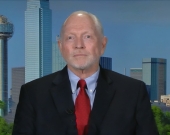Professor Ian Lustick for Gulan: None of the actors, including Iran, the United States, and Israel, want a wide and intense regional war

Dr. Lustick holds the Bess W. Heyman Chair in the Political Science Department of the University of Pennsylvania. He teaches Middle Eastern politics, comparative politics, and computer modeling. He is a recipient of awards from the Carnegie Corporation, the National Science Foundation, the National Endowment for the Humanities, and the Social Sciences Research Council. Before coming to Penn he taught for fifteen years at Dartmouth College and worked for one year in the Department of State. His present research focuses on the implications of the disappearance of the option of a negotiated “two-state solution” to the Israeli-Palestinian conflict and techniques of counterfactual forecasting. He is a past president of the Politics and History Section of the American Political Science Association and of the Association for Israel Studies, and a member of the Council on Foreign Relations. Among his books are Arabs in the Jewish State (1980); For the Land and the Lord (1988, 1994); Unsettled States, Disputed Lands (1993); Trapped in the War on Terror (2006); and Paradigm Lost (2019). In a written interview he answered our questions like the following:
Gulan: How do you characterize the current war between Israel and Hezbollah in terms of causes and consequences?
Professor Ian Lustick: Israel has historically been willing to invade Lebanon to remove military capacities there which it finds substantial enough to restrict its use of its own military power for fear of attack from Lebanon. But wars require a pretext. In 1982 it was the killing of an Israeli official in London by an extreme Palestinian organization that was the pretext for the invasion of Lebanon that was carried out for much larger reasons. The current war began because Hezbollah’s limited strikes against Israel in solidarity with Gaza Palestinians drove 60,000 Israelis from their homes in the North. That created an opportunity for the military, and elements in the government, who have long wanted to end Hezbollah’s deterrent threat against Israel, to escalate the war dramatically. This could only happen, of course, because the United States failed to put a stop to the fighting in Gaza.
Gulan: What is the likelihood of the conflict escalating into a broader regional war?
Professor Ian Lustick: It appears that none of the actors, including Iran, the United States, and Israel, want a wide and intense regional war. That doesn’t mean it can’t happen, but I consider it a low probability.
Gulan: How do you assess the US role with regard this war, what it could and should have done differently?
Professor Ian Lustick: The United States should have very early on told Israel that it would support sanctions and tough UN Security Council resolutions and limits on arms deliveries unless it negotiated seriously to achieve a ceasefire and hostage/prisoner exchange. That would have ended Hezbollah’s attacks in the north and prevented attacks between Israel and Iran.
Gulan: How the normalization of relations between Israel and some Arab countries be affected by this war?
Professor Ian Lustick: On this issue Hamas has succeeded in pushing the Saudi Arabia focused normalization plan well into the future. Since Israel will certainly not accept the two-state solution, the Arab states will have to have time to forget their commitment to it or shift dramatically to a strategy demanding the democratization of all of Israel, including the Palestinian territories it dominates.
Gulan: How might this conflict affect other regional players, such as Saudi Arabia or the UAE?
Professor Ian Lustick: Their resources will be crucial to the rebuilding of Gaza. The anger and hatred generated among their populations and in the Arab world in general by the barbarity of what has been happening will make it substantially more difficult to engage in the kind of public normalization of relations with Israel that we saw within the framework of the Abraham Accords.
Gulan: To what extent the regional balance of power is going to shift as the result of weakening of Hezbollah as the crown jewel of Iran’s influence in the region?
Professor Ian Lustick: Locally, Israel will be less deterred from using its military power in and over Lebanon and Syria, but regionally it would appear that Israel and Iran can still both deter one another from attempting “decisive” use of their military power.















